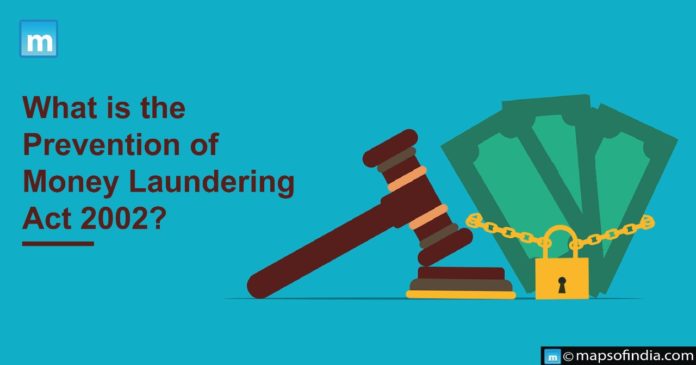Recently, a group of petitioners challenged the functions of the Enforcement Directorate in the Supreme Court. They also questioned the source of the power of ED. Along with this, Supreme Court introduced some reforms in the Prevention of Money Laundering Act (PMLA) sections 2002.
What is money laundering?
Money laundering is concealing the origin of money obtained from illegal activities such as drug trafficking, corruption, embezzlement, or gambling and converting the illegal money into a legitimate source. It is an issue in itself. It is dangerous for internal and external security. Money laundering cases include terrorist activities. To prevent these illegal activities, the government of India (GOI) introduced the Prevention of Money Laundering Act (PMLA) in 2002.
The Prevention of Money Laundering Act (PMLA) 2002
The Prevention of Money Laundering Act (PMLA) 2002 is an act which prevents money laundering and provides confiscation of property which is derived from or evolved in money laundering and for matters connected in addition to that.
The Enforcement Directorate works under the Department of Revenue, Ministry of Finance. The Ministry of Finance is responsible for administering the act.
Background of PMLA 2002
To regulate the act, a batch of 241 petitions were challenged in the supreme court. Through these petitions, the constitutionality of various law provisions was challenged.
Reforms in the Act
1. No need to provide ECIR while arrests
The Supreme court has directed that enforcement case information reports (ECIR) cannot be equated with FIR. ECIR is an internal document of the enforcement directorate. Hence, the supply of ECIR to the accused is not mandatory, and only disclosure of reasons or bases during the arrest is enough.
2. Offence of money laundering
Anyone who directly or indirectly attempts to indulge or knowingly a party is involved in any process or activity connected with the proceeds of crime and portraying it as untainted property shall be guilty of the offence of money laundering. The supreme court has also directed the use of section 5, which is the attachment of property involved in money laundering.
Section 5(1) of the act empowers the director or deputy director to provisionally attach property for 180 days if he has reason to believe that :
- Any person is in a position with the proceeds of a crime
- Such proceeds of crime could be concealed, transferred, or dealt with in any manner, which may have consequences in frustrating the proceedings related to confiscating such proceeds of time.
Thus, these suspected proceeds of crime can be seized from the possession of any person, irrespective of whether the person has indulged in any money laundering process or whether he has or has not acquired the proceeds of crime.
What is the burden of proof?
If a person is accused of having committed an offence, under section 3, named as the “burden of proof”, proceeds that crimes are untainted property that shall be on the accused.
Similarly, in criminal cases, it is for prosecution. So this section was challenged later. The Supreme Court also held that section 24, which is the “burden of proof,” is reasonable. Nexus with the purposes and objects sought to be achieved.
Statements by the accused to the Enforcement Directorate (ED)
Investigating officers can record or summon the statements of persons who are concerned and also make a note of the inventory of such records or property statements which are made by the accused to Enforcement Directorate (ED) officials not to be hit by Article 20(3), which lays down rules against self-incrimination.
Punishments
The punishment for the offence of money laundering is a minimum of 3 years of imprisonment and a maximum of 7 years of imprisonment with a fine.
Narcotic drugs
Suppose the offence is related to narcotic drug activities. In that case, the punishment for this offence will be a minimum of 3 years imprisonment and a maximum of 10 years imprisonment with a fine.




